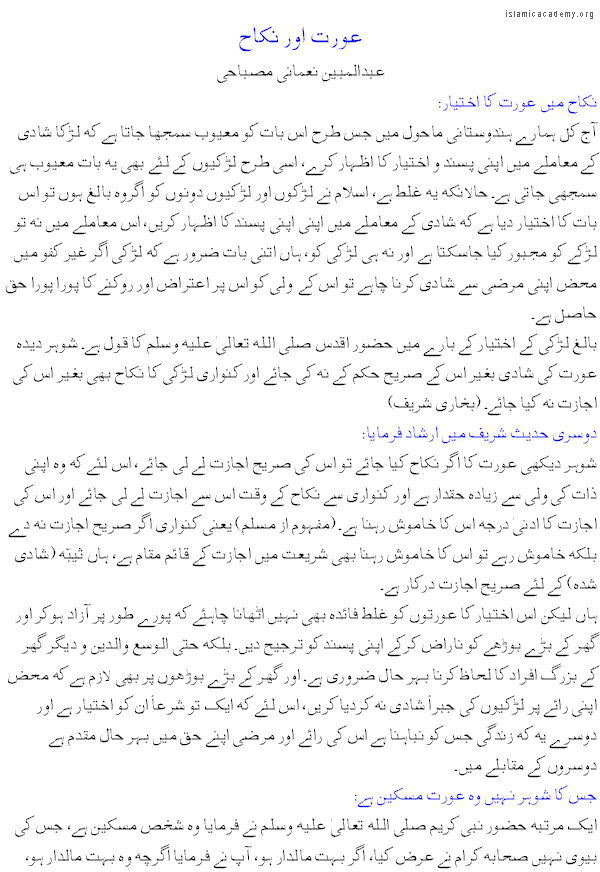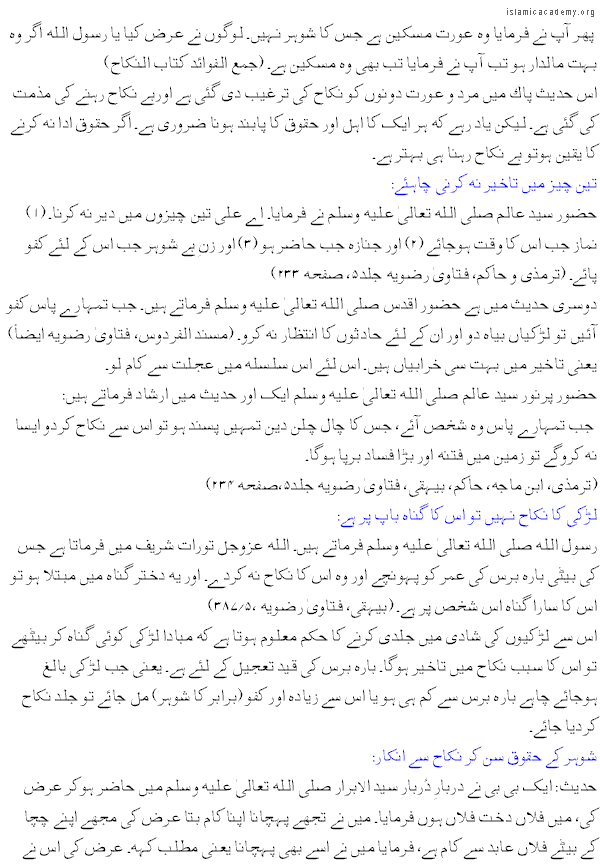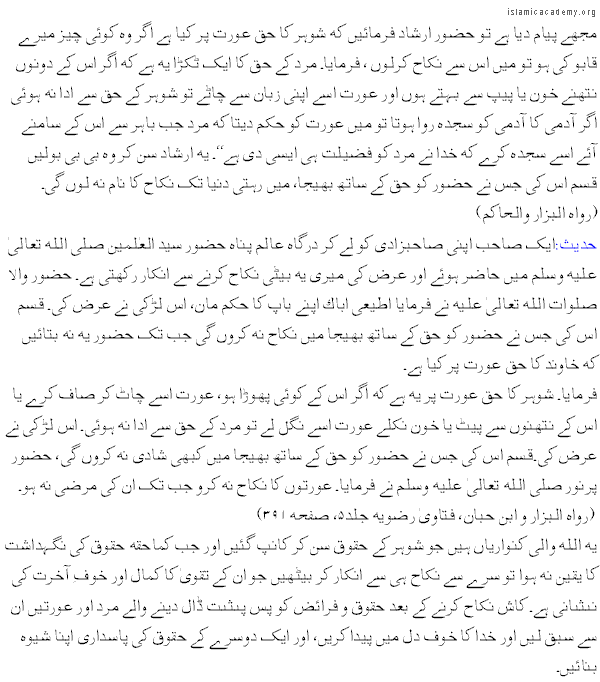
Hire Me For Your Work
Thursday, 25 October 2012
Six Kalimas in English Tajveed
1) Kalma Tayyab: Laa ilaaha illal Lahoo Mohammadur Rasool Ullah
2) Kalma Shaadat: Ashahado An Laa ilaaha illal Laho Wahdahoo Laa Shareeka Lahoo Wa Ash Hado Anna Mohammadan Abdo Hoo Wa Rasoolohoo.
3) Kalma Tamjeed: Subhanallahe Wal Hamdulillahe Wa Laa ilaha illal Laho Wallahooakbar. Wala Haola Wala Quwwata illa billahil AliYil Azeem.
4) Kalma Tauheed: Laa ilaha illal Lahoo Wahdahoo Laa Shareekalahoo Lahul Mulko Walahul Hamdo Yuhee Wa Yumeeto Wa Hoa Haiy Yul La Yamooto Abadan Abada Zul Jalali Wal ikraam Beyadihil Khair. Wa hoa Ala Kulli Shai In Qadeer.
5) Kalma Astaghfar: Astaghfirullah Rabbi Min Kullay Zambin Aznabtuho Amadan Ao Khat An Sirran Ao Alaniatan Wa Atoobo ilaihe Minaz Zambil Lazee Aalamo Wa Minaz Zambil Lazee La Aalamo innaka Anta Allamul Ghuyoobi Wa Sattaarul Oyobi Wa Ghaffaruz Zunoobi Wala Haola Wala Quwwata illa billahil AliYil Azeem.
6) Kalma Radde Kufr: Allah Humma inni Aaoozubika Min An Oshrika Beka Shai Aown Wa Anaa Aalamo Behi Wa Astaghfiroka Lima laa Aalamo Behi Tubtu Anho Wa Tabarrato Minal Kufri Washshirki Wal Kizbi Wal Jheebati Wal Bidaati Wan Nameemati Wal Fawahishi Wal Bohtani Wal Maasi Kulliha Wa Aslamtoo Wa Aamantoo Wa Aqoolo Laa ilaaha illal Lahoo Mohammadur Rasool Ullah.
Children's Islamic Etiquette and Manners
1) Should greatly respect Parents and follow their orders (within Islamic Law).
2) Should greatly respect Islamic Teachers and Scholars.
3) Should greatly respect Quran. It's HARAM to touch Quran without Wazoo. Should respect Islamic Books and Literature too.
4) Should greatly respect the direction of Qibla. It's prohibited to extend ones feet towards Qibla and to sleep while feet are extended towards Qibla.
5) Prophet Mohammad (peace be upon him) should be respected and loved more than anyone in the world. Whenever hear his lovely name always say Dorood, at least say Sallal Laho Alaihe Wasalam.
6) Azan should be heard with great concentration and should be answered (repeating the words after every sentence). It is prohibited to talk during Azan.
7) Should be quite when performing Wazoo should not talk to others. Should recite Dua or Dorood during Wazoo.
8) Should eat only Halal and Clean food. Should never ever eat Haram food.
9) Should recite Quran everyday.
10) Must pray five times a day, on time.
11) Should avoid every bad conversation and every bad habit.
12) It is a Great Sin to Dance, to Listen to Music, to Sing songs and to make images or to take photos of living beings ( Human and Animals).
13) Always avoid Lies, Back Biting and Tale Bearing.
14) Always keep your body, cloths and home clean.
15) There is no greater deed than to Learn and Teach Islamic Knowledge. Should never be ashamed of asking any Islamic Question.
16) Should always treat every one with great respect and manners.
17) Children should not call their parents with their names and a wife should never call her husband with his name.
18) It is a bad manner to extend your feet towards elders.
19) Should always respect elderly people and if they are sitting on floor, children should never sit on a chair.
2) Should greatly respect Islamic Teachers and Scholars.
3) Should greatly respect Quran. It's HARAM to touch Quran without Wazoo. Should respect Islamic Books and Literature too.
4) Should greatly respect the direction of Qibla. It's prohibited to extend ones feet towards Qibla and to sleep while feet are extended towards Qibla.
5) Prophet Mohammad (peace be upon him) should be respected and loved more than anyone in the world. Whenever hear his lovely name always say Dorood, at least say Sallal Laho Alaihe Wasalam.
6) Azan should be heard with great concentration and should be answered (repeating the words after every sentence). It is prohibited to talk during Azan.
7) Should be quite when performing Wazoo should not talk to others. Should recite Dua or Dorood during Wazoo.
8) Should eat only Halal and Clean food. Should never ever eat Haram food.
9) Should recite Quran everyday.
10) Must pray five times a day, on time.
11) Should avoid every bad conversation and every bad habit.
12) It is a Great Sin to Dance, to Listen to Music, to Sing songs and to make images or to take photos of living beings ( Human and Animals).
13) Always avoid Lies, Back Biting and Tale Bearing.
14) Always keep your body, cloths and home clean.
15) There is no greater deed than to Learn and Teach Islamic Knowledge. Should never be ashamed of asking any Islamic Question.
16) Should always treat every one with great respect and manners.
17) Children should not call their parents with their names and a wife should never call her husband with his name.
18) It is a bad manner to extend your feet towards elders.
19) Should always respect elderly people and if they are sitting on floor, children should never sit on a chair.
The Marriage Ceremony
Some relevant points to be noted are:
1. Engagement or Mangni does not qualify the future spouses to go out together, even if the parents consent. Man and woman become permissible for each other only after the performance of Nikah.
2. Dowry
The unislamic system of demanding and accepting dowry must be avoided at all costs. Shariah does not make any expense incumbent on the bride/bride's parents. Even the marriage expenses, it is recommended are to be borne by the bridegroom.
However, the bride can bring whatever she wants of her free will, and it will always belong to her.
3. Other Unislamic Customs
Many other unislamic customs have crept into the marriage ceremony of some Muslims. These customs are either borrowed from non-Muslim cultures or continue because they are established in past generations. One must avoid them if they are against the Shariah, even if some people are displeased. Other customs like the breaking of coconut etc. also do not feature among the Islamic rituals. All actions, customs etc. which show disrespect to Islam or weaken the importance of Islam have to be avoided.
4. Haraam Acts
Some of the rituals in marriage ceremonies are absolutely haraam like the playing of music. It is also haram for ladies to go for mixed gatherings without proper hijab. Such things invite divine wrath and take away the blessings of this auspicious occasion.
In the Islamic Law, marriage is an 'aqd, a contract. The components of this contract are as follows:
A. Proposal
In Islam the process of proposal by a man to a woman for her hand in marriage, or for that matter, to her family, is encouraged. Islam considers this natural, and recommends it as an act of respectability and dignity for women.
B. Mahr
And the intending husband is asked to offer a Mahr to the bride.
The Quran says, And give women their Mahr as a free gift, but if they of themselves be pleased to give up to you a portion of it, then eat it with enjoyment and with wholesome result. [28]
The following points are worthy of consideration:
· Mahr must be agreed upon by the marrying partners themselves, not by parents.
· Mahr is her right, to which her husband remains indebted.
· It is a free gift and not her price.
The Mahr may be cash, kind or non-material (like training or teaching something). It can be paid up front or can be in form of promise to pay upon demands decided prior to the solemnization of marriage.3 Moajjal (immediate), Muwajjal and Indat-talab (on demand).
However, it is much recommended to pay it before or at the time of Nikah itself.
C. The Nikah Ceremony
According to Shariah, the wife-to-be says, 'An Kah'tu nafsaka a'lal mah'ril ma'loom'
“I have given away myself in Nikah to you, on the agreed Mahr.”
Immediately, the man (bridegroom) says, 'Qabiltun Nikaha'.
“I have accepted the Nikah.”
With these pronouncements, they become husband and wife.
If the marrying partners are not able to recite the formula in Arabic, one or two persons or priests[29] are appointed and authorized to officiate. One who represents the bride would first seek her explicit consent to officiate on her behalf, and so would the other who acts on behalf of the groom. Naturally, there would be a slight variation in the pronouncements, because the persons reciting them are appointees. A person who represents the bride would initiate by saying, “Ankah'tu muwakkilati muwakkilaka a'lal mah'ril ma'loom.”
“I give away in Nikah the woman who has thus appointed and authorized me, to the man who has authorized you, on an agreed Mahr.”
The groom's representative would respond, “Qabiltunnikaaha limuwakkili a'lal mah'ril ma'loom.”
“I accept the Nikah on behalf of the one who has appointed me, on the agreed Mahr.”
It is mustahab to recite a brief discourse or Khutba before the Nikahformula is enunciated. In this Khutba, Allah is praised for His Wisdom in regulating the lawful process of procreation, and then the traditions from the Prophet (s.a.) are also recited.
D. Time of Marriage Ceremony
Though basically marriage is allowed at all times, there are some days on which marriage is not recommended; some of these are based on ahadithand some on cultural, historical reasons.
Generally, we can categorize these days into three: (a) There are someahadith which say that it is makruh (not recommended) to have a marriage ceremony on the days when the moon is in the constellation of Scorpio (this is known as al-qamar fil aqrab or qamar dar aqrab), during the last two or three days of the lunar months, and on Wednesdays. (b) There are certain days of the Islamic calendar which have become associated with the early events of the Islamic history; for example, the 10th of Muharram is the day of mourning for the massacre at Karbala or the day of the Prophet's death in Safar, etc. Since such days are commemorated by the Muslims as days of mourning, it is socially and, to some extent, religiously not recommended to have a marriage ceremony on such days.3
The Shia Ithna Ashari (Twelver Shias), especially in India and Pakistan, rarely perform marriage ceremony between the 1st of Muharram and the 8th of Rabi al-Awwal as this period includes the mourning days of Muharram culminating in the martyrdom of Imam Askari (a.s.). The 9th Rabi al-Awwal is celebrated as Eid-e-Zahra.
If there is a need, however, Nikah, can be performed at any time.
E. Permission of the Bride-to-be/Father
The girl's consent is necessary and has to be taken by her representative, directly.
In case of a virgin/spinster the father's or the grandfather's permission is also necessary. However if the permission is unreasonably withheld under some conditions or the girl has no father/paternal grandfather it is not necessary.
However, a woman who is not a virgin, does not require any permission in case of remarriage.
F. Valima (Dinner)
Valima is highly recommended on the groom. The relatives, neighbours and friends must be invited for Valima. However, lavish spending is not advisable especially when the same money can be used effectively by the couple.
Notes:
[28] Surah Nisa 4:4
[29] Aalim, Maulana or those who are conversant with the correct Nikah procedure and proper Arabic pronunciation.
Subscribe to:
Posts (Atom)
















